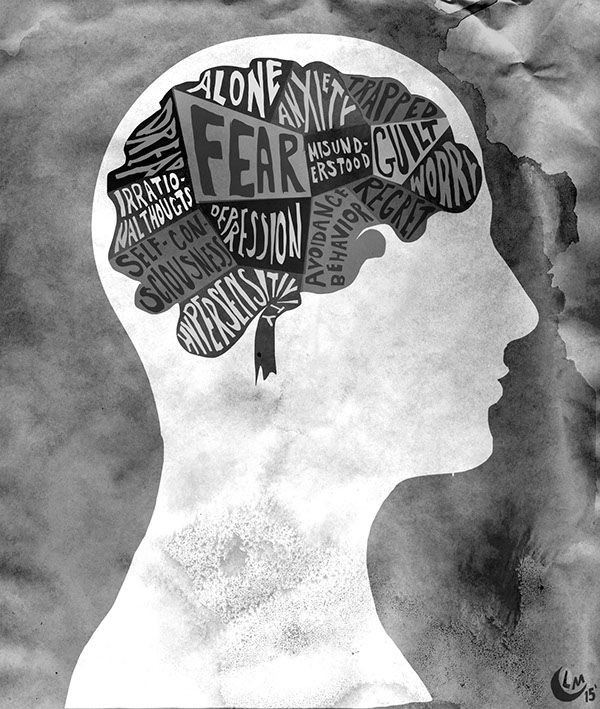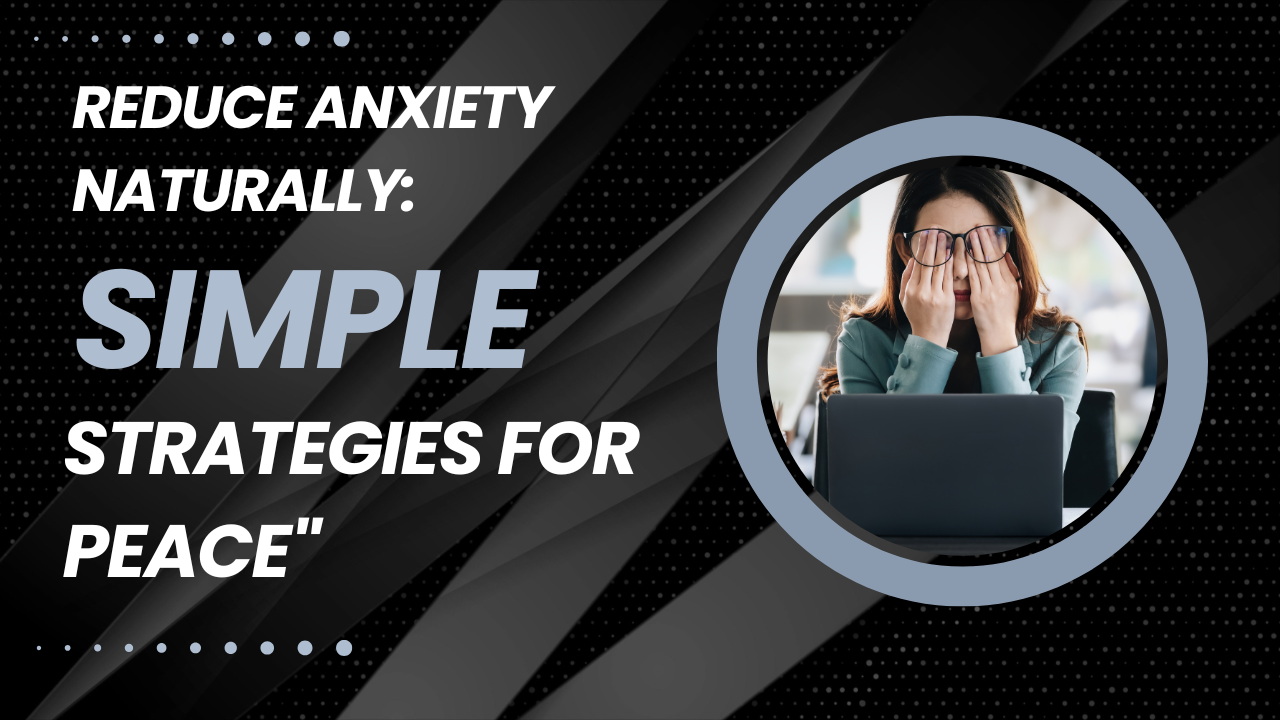Anxiety is a prevalent mental health condition that affects millions of people globally. While it’s normal to experience feelings of anxiety occasionally, chronic anxiety can interfere with daily activities and overall well-being. For many individuals, these persistent feelings of worry or fear can impact work, relationships, and physical health. Recognizing the importance of managing anxiety is crucial, as untreated anxiety can worsen over time.
The good news is that there are several natural approaches to help reduce anxiety and regain control over your emotional and physical state. Incorporating techniques like mindfulness, exercise, and proper nutrition into your daily routine can significantly lower anxiety levels. These practices not only help soothe the mind but also promote long-term mental resilience. In this article, we will explore the causes of anxiety and provide effective, natural solutions to help you manage anxiety and improve your overall well-being, allowing you to lead a more balanced and fulfilling life.
What is Anxiety ?

Anxiety is a natural response to stress, characterized by feelings of unease, worry, or fear, often about uncertain outcomes. Everyone experiences anxiety at different points in their lives, whether it’s before a big presentation, an important event, or during times of change. While occasional anxiety is a normal part of life, when it becomes persistent or overwhelming, it can develop into an anxiety disorder.
Anxiety disorders are more than just occasional stress. They involve prolonged and intense feelings of fear or worry that interfere with daily functioning. The body reacts to these anxious thoughts with both emotional and physical symptoms.
Common emotional symptoms include excessive worry about future events, irritability, and an overwhelming sense of dread. Individuals may also experience an inability to relax or concentrate, as anxious thoughts dominate their mind.
Physically, anxiety can cause rapid heartbeats, shortness of breath, dizziness, muscle tension, and even gastrointestinal issues. The intensity of these symptoms varies from person to person, but when anxiety becomes chronic, it can significantly affect a person’s quality of life and well-being.
Types of Anxiety Disorders
Anxiety disorders encompass a range of conditions, including:
- Generalized Anxiety Disorder (GAD): GAD involves persistent, excessive worry about everyday things like work, health, or social interactions, even when there’s no immediate threat. This constant anxiety makes it hard to focus or relax, often leading to physical symptoms like restlessness, fatigue, and muscle tension.
- Panic Disorder: Panic Disorder is characterized by sudden, intense panic attacks, marked by chest pain, dizziness, sweating, and a racing heart. These attacks occur without warning and can make individuals fear losing control or having a heart attack, often leading them to avoid places where attacks have occurred.
- Social Anxiety Disorder: Social Anxiety Disorder is an intense fear of being judged or embarrassed in social situations. People with this disorder feel extreme discomfort in social settings, avoiding interactions like public speaking or meeting new people, which can disrupt relationships and daily life.
- Specific Phobias: Specific Phobias are intense fears of particular objects or situations, such as heights, spiders, or flying. These fears lead to avoidance of the phobic trigger, causing distress and limiting activities, even though the actual danger is minimal.
Prevalence of Anxiety
According to the Anxiety and Depression Association of America, anxiety disorders affect about 18% of the U.S. population. This makes anxiety one of the most common mental health conditions in the country, and it’s estimated that millions of people worldwide experience some form of anxiety every year.
Causes of Anxiety
Understanding the root causes of anxiety is crucial for managing and reducing it. Several factors contribute to the onset and perpetuation of anxiety, including biological, environmental, psychological, and lifestyle-related factors.
Biological Factors
- Genetic Predisposition: If you have a family history of anxiety or other mental health disorders, you may be more likely to develop anxiety yourself.
- Brain Chemistry: Neurotransmitters such as serotonin, dopamine, and GABA play a significant role in regulating mood and emotions. Imbalances in these chemicals can lead to anxiety.
Environmental Factors
- Stressful Life Events: Major life changes such as moving, losing a job, or experiencing trauma can trigger or exacerbate anxiety.
- Chronic Stress: Prolonged stress, whether from work, personal relationships, or health issues, can lead to anxiety becoming a regular part of your life.
Psychological Factors
- Cognitive Biases: People with anxiety often have distorted thought patterns, such as overestimating the likelihood of negative events, which fuels the anxiety response.
- Personality Traits: Certain personality traits, such as being highly sensitive, perfectionistic, or overly self-critical, may increase the likelihood of experiencing anxiety.
Lifestyle and Habits
- Poor Diet: A diet high in processed foods and sugar can contribute to blood sugar imbalances, which can aggravate anxiety symptoms.
- Lack of Exercise: Physical inactivity can affect mood and anxiety levels, as regular exercise helps reduce stress hormones and boosts endorphins.
Environmental Stressors
- Pollution: Exposure to environmental factors like air and noise pollution has been linked to higher levels of anxiety. Living in urban areas or noisy neighborhoods may heighten the risk of experiencing anxiety.
Therapy for Anxiety

While natural remedies are an effective way to manage anxiety, professional therapy can also play an important role in addressing underlying issues. Below are some common therapeutic approaches used to treat anxiety:
Cognitive Behavioral Therapy (CBT)
CBT is one of the most well-researched and effective treatments for anxiety. It focuses on identifying and changing negative thought patterns and behaviors that contribute to anxiety. By challenging irrational fears and adopting healthier coping strategies, individuals can reduce the frequency and intensity of their anxiety symptoms.
Exposure Therapy
Exposure therapy is based on the idea of gradually confronting feared situations in a controlled and safe manner. This helps reduce the anxiety response over time. For example, someone with a fear of public speaking might start by practicing speaking in front of a mirror and gradually work up to speaking in front of a small group, eventually building confidence.
Medication
- Antidepressants (SSRIs and SNRIs): These medications, such as sertraline (Zoloft) and venlafaxine (Effexor), are commonly prescribed for anxiety because they regulate serotonin and norepinephrine levels in the brain.
- Benzodiazepines: These medications, including Xanax and Ativan, provide short-term relief by calming the central nervous system. However, they are typically not recommended for long-term use due to the risk of dependency.
Natural Methods to Reduce Anxiety
If you’re looking for natural ways to manage your anxiety, there are numerous strategies and techniques you can incorporate into your daily life.
Mindfulness Meditation : Mindfulness meditation involves focusing on the present moment and observing your thoughts and feelings without judgment. By practicing mindfulness, you can interrupt the cycle of anxious thinking and promote relaxation. Research has shown that mindfulness can significantly reduce anxiety symptoms and improve emotional regulation.
Deep Breathing and Relaxation Techniques : Breathing exercises, such as diaphragmatic breathing, can activate the parasympathetic nervous system, which calms the body and reduces the stress response. Some popular breathing techniques include:
- Box Breathing: Inhale for 4 seconds, hold for 4, exhale for 4, and hold for 4. Repeat for several minutes.
- 4-7-8 Breathing: Inhale for 4 seconds, hold for 7, exhale for 8. This technique can quickly calm the nervous system.
Regular Physical Activity : Exercise is a powerful natural remedy for anxiety. Physical activity increases the production of endorphins, the body’s natural mood elevators, which can help reduce stress and anxiety. Regular aerobic exercise, such as walking, running, or swimming, can be particularly effective. Yoga and tai chi, which combine movement with mindfulness, are also beneficial for reducing anxiety.
Herbal Supplements
Certain herbs and supplements have been shown to have calming effects on the nervous system:
- Chamomile: Chamomile tea is known for its calming properties and can help reduce mild anxiety.
- Lavender: The scent of lavender, whether through essential oils or a few drops in a bath, has been shown to reduce anxiety levels and promote relaxation.
- Ashwagandha: This adaptogenic herb has been found to reduce stress and anxiety levels by helping the body adapt to stress.
Nutrition and Diet : A well-balanced diet plays a key role in managing anxiety. Certain nutrients, such as omega-3 fatty acids, magnesium, and B vitamins, are essential for brain health and stress management. Foods rich in antioxidants, like berries and leafy greens, can reduce oxidative stress, which is linked to anxiety. On the other hand, caffeine and sugar can exacerbate anxiety symptoms, so it’s best to limit their intake.
Sleep Hygiene : A lack of sleep is closely tied to increased anxiety. Poor sleep quality can heighten stress levels and make it harder to manage anxiety during the day. Improving sleep hygiene, such as maintaining a regular sleep schedule, reducing screen time before bed, and creating a calming bedtime routine, can help reduce anxiety and improve overall well-being.

Lifestyle Changes to Manage Anxiety
Social Support and Connection
Strong social connections are essential for mental health. Having a support system of family, friends, or a community can provide comfort and reduce feelings of isolation. Sharing your feelings and experiences with others can help you gain perspective and feel understood.
Time in Nature
Spending time in natural environments can significantly reduce anxiety. Studies have shown that being outdoors in green spaces can lower cortisol levels and improve mood. A walk in the park or a hike in the woods can provide immediate relief from anxious feelings.
Journaling
Writing down your thoughts and emotions can help process anxiety and gain clarity. Journaling can help you identify triggers, reflect on positive experiences, and organize your thoughts. Expressive writing can also serve as an emotional release, reducing the intensity of anxious feelings.
Limiting Stressors
Take an active role in managing your stress. Identify stressors in your life and see if there are ways to reduce or eliminate them. This may include setting boundaries at work, delegating tasks, or removing negative influences from your life.
Digital Detox
Constant exposure to social media and digital devices can increase anxiety. A digital detox—taking regular breaks from screens—can help you disconnect from the constant stream of information and allow you to focus on self-care and relaxation.
When to Seek Professional Help
While natural remedies can be effective for managing anxiety, there are times when it becomes overwhelming and unmanageable. If anxiety is interfering with your daily life or causing significant distress, it’s important to seek help from a healthcare professional. A doctor or therapist can evaluate the severity of your condition and suggest appropriate treatments, such as therapy or medication.
In many cases, combining natural methods with professional treatment offers the most effective approach. Therapy options like Cognitive Behavioral Therapy (CBT) can help address the underlying causes of anxiety, while medications can provide relief from severe symptoms. Meanwhile, incorporating healthy lifestyle changes, such as regular exercise, a balanced diet, and stress-reduction techniques, can help manage anxiety on a daily basis.
By working closely with a mental health professional and adopting holistic strategies, you can take control of your anxiety, improve your emotional well-being, and lead a more balanced, fulfilling life.
Conclusion
Anxiety is a complex condition that can affect various aspects of your life. Fortunately, there are numerous natural ways to manage anxiety and reduce its impact. From practicing mindfulness meditation and regular exercise to exploring herbal remedies and improving your diet, there are many effective strategies to incorporate into your daily routine.
By understanding the causes of anxiety and implementing these natural methods, you can take an active role in managing your mental health. And remember, if anxiety persists or worsens, don’t hesitate to seek professional help. With the right approach, it’s possible to reduce anxiety and lead a calmer, more balanced life.
FAQs
What are some natural ways to reduce anxiety?
Natural methods like mindfulness meditation, deep breathing exercises, regular exercise, herbal supplements, and a balanced diet can help manage anxiety.
Can exercise really help reduce anxiety?
Yes, physical activity helps reduce stress hormones and boosts endorphins, which can improve mood and lower anxiety levels.
Is there a specific diet that can help with anxiety?
Eating a balanced diet rich in omega-3 fatty acids, magnesium, and B vitamins can support brain health and help manage anxiety. Avoiding excessive caffeine and sugar may also help.
How does mindfulness meditation reduce anxiety?
Mindfulness meditation helps you focus on the present moment, reducing overthinking and the worry that often fuels anxiety.
Can herbal supplements help with anxiety?
Certain herbs like chamomile, lavender, and ashwagandha have been shown to promote relaxation and reduce anxiety symptoms.
When should I seek professional help for anxiety?
If anxiety becomes overwhelming, interferes with daily activities, or causes significant distress, it’s important to consult a healthcare professional.
Are there any risks with using natural remedies for anxiety?
While natural remedies are generally safe, some may interact with medications or have side effects. It’s important to consult a doctor before trying new supplements.
How long does it take to see results from natural methods?
The time frame varies, but many people experience improvements in their anxiety symptoms within a few weeks of consistently practicing natural methods like meditation and exercise.


